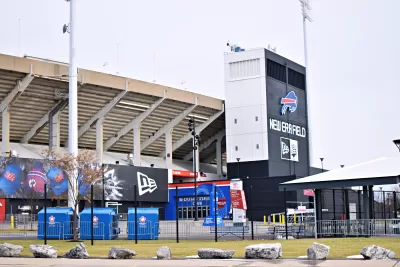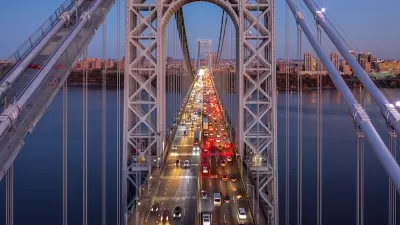The total estimated cost of the NFL stadium planned for the Buffalo Bills in Orchard Park, south of Buffalo, New York, comes to $1.4 billion—including $850 million in public funding.

Publicly funded stadiums for privately owned professional sports teams are facing increasing amounts of criticism for draining public coffers to the benefit of wealthy team owners. Three cities—Oakland, California, San Diego, California, and St. Louis, Missouri—found themselves on the losing end in 2016 after facing expensive demands from National Football League teams.
Buffalo, New York is choosing the other path by devoting major financial support to keep their beloved franchise local. A plan for a Downtown Stadium, proposed in August 2014, failed.
"After months of negotiations, the National Football League team has reached an agreement with New York State and Erie County to build an open-air stadium in Orchard Park," report Tim O'Shei and Jason Wolf for the Buffalo News. "New York is slated to contribute $600 million and Erie County $250 million toward construction."
The $850 million in taxpayer funding attached the stadium's price tag is less than anticipated, according to a soundbite from the article attributed to New York Governor Kathy Hochul.
The article also includes planning details for the new stadium, including a superlative: "The new stadium will be built directly across the street on Abbott Road, adjacent to Erie Community College’s South Campus, in what Hochul called 'the largest construction project in Western New York history.'"
More details on the stadium project can be read on the Buffalo Bills website.
FULL STORY: Buffalo Bills, New York State, Erie County reach 'ironclad' 30-year deal to build $1.4 billion stadium

Planetizen Federal Action Tracker
A weekly monitor of how Trump’s orders and actions are impacting planners and planning in America.

Maui's Vacation Rental Debate Turns Ugly
Verbal attacks, misinformation campaigns and fistfights plague a high-stakes debate to convert thousands of vacation rentals into long-term housing.

San Francisco Suspends Traffic Calming Amidst Record Deaths
Citing “a challenging fiscal landscape,” the city will cease the program on the heels of 42 traffic deaths, including 24 pedestrians.

Defunct Pittsburgh Power Plant to Become Residential Tower
A decommissioned steam heat plant will be redeveloped into almost 100 affordable housing units.

Trump Prompts Restructuring of Transportation Research Board in “Unprecedented Overreach”
The TRB has eliminated more than half of its committees including those focused on climate, equity, and cities.

Amtrak Rolls Out New Orleans to Alabama “Mardi Gras” Train
The new service will operate morning and evening departures between Mobile and New Orleans.
Urban Design for Planners 1: Software Tools
This six-course series explores essential urban design concepts using open source software and equips planners with the tools they need to participate fully in the urban design process.
Planning for Universal Design
Learn the tools for implementing Universal Design in planning regulations.
Heyer Gruel & Associates PA
JM Goldson LLC
Custer County Colorado
City of Camden Redevelopment Agency
City of Astoria
Transportation Research & Education Center (TREC) at Portland State University
Jefferson Parish Government
Camden Redevelopment Agency
City of Claremont




























